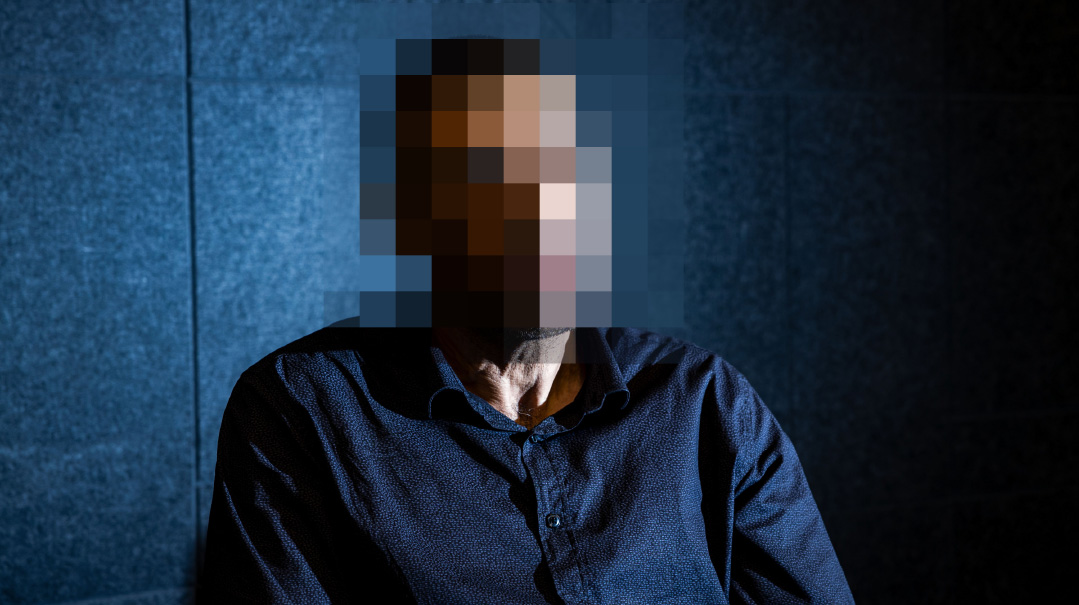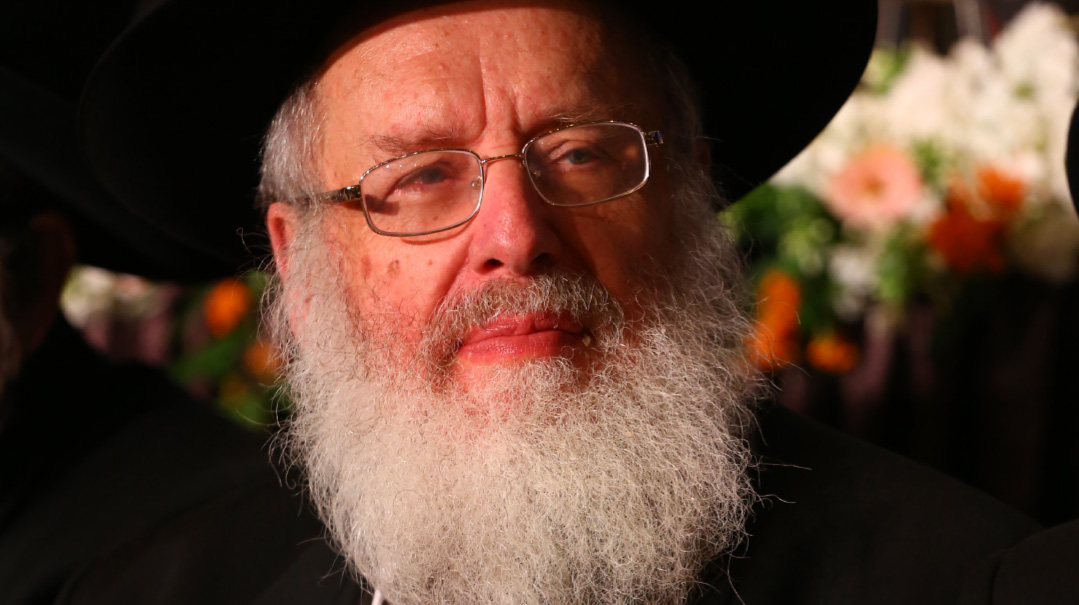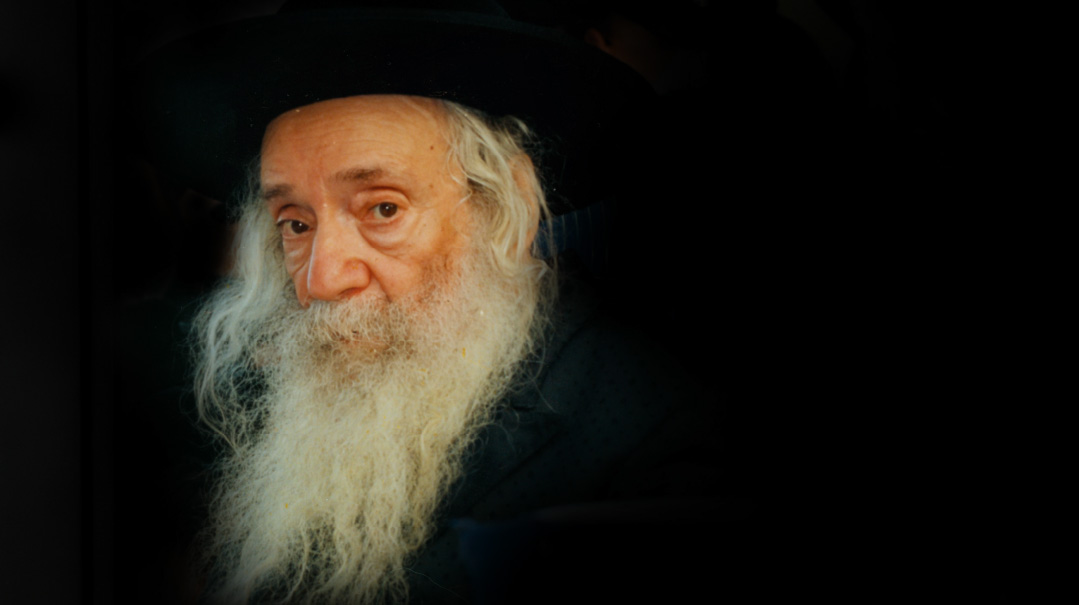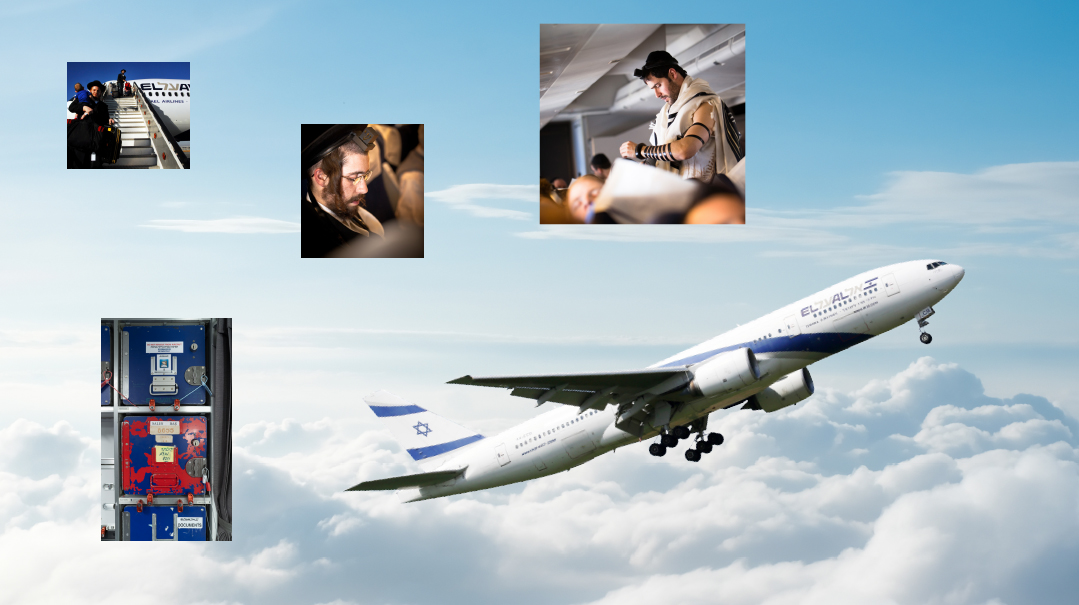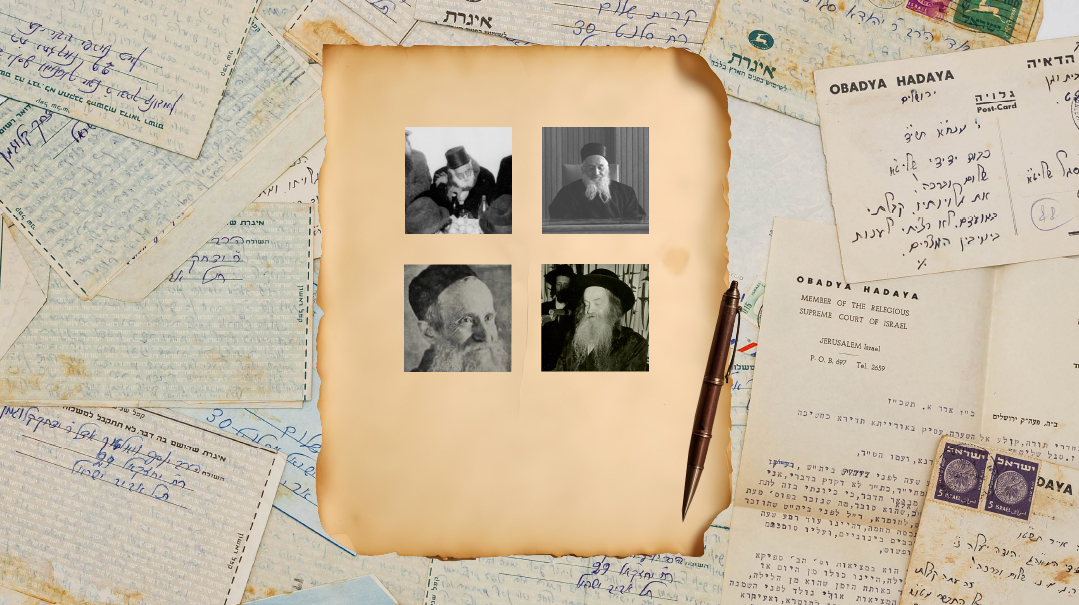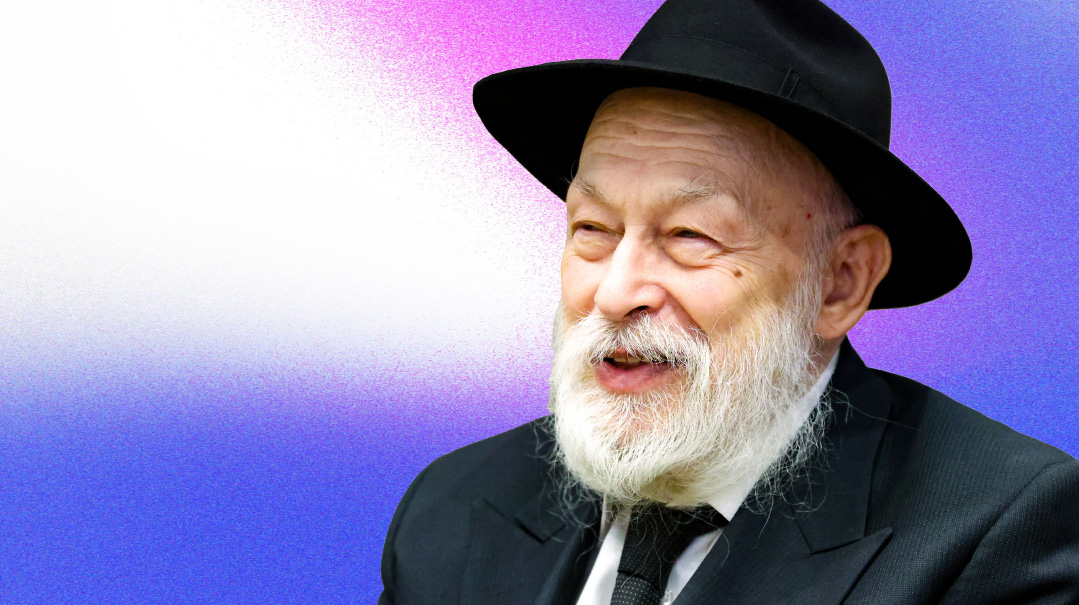No Comfort but Love

A year after his forced goodbye to Alta, Avrohom Fixsler is determined to turn her tragic legacy into something positive
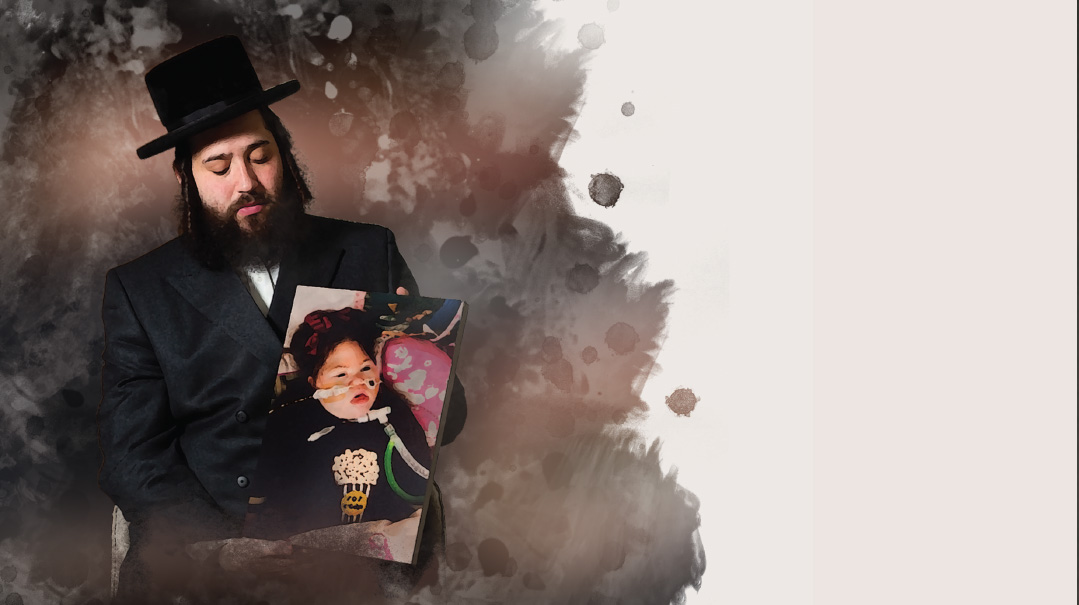
Photos: Elchanan Kotler, Family archives
Two weeks ago, Avrohom Fixsler had a nightmare — one that accompanies his every waking hour.
As he slept on Shabbos, his mind took him back in time a year, to stand with his wife by their daughter Alta’s bedside in a Manchester hospital.
The two-year-old had spent much of her short life at the center of an international storm. British medical authorities said that the brain-damaged girl faced a lifetime of pain and were determined to end Alta’s life in the name of compassion. Her parents — newcomers to the country — contended that their daughter was in no pain, and fought the decision through Britain’s legal system and in the court of horrified public opinion.
As they stood around her bedside that Monday, October 18, 12 Cheshvan 2021, Alta was exactly as she’d always been — breathing with the help of a respirator, unaware of the world around her, the center of her loving parents’ lives.
Then in Avrohom Fixsler’s replay of the scene, something went dreadfully wrong.
A doctor arrived, but he was no white-coated angel of mercy. He’d come to pull the plug on the toddler’s ventilator.
And that’s where the bad dream turned into a nightmare.
“In my dream,” recalls the bereaved father, “I started to cry and begged him, ‘Please don’t turn off the machine! Please let her go.’ ”
A year after he had to watch, helpless, as his daughter’s life ended before his eyes, Avrohom Fixsler struggles to move on.
For this big man who used all the assertiveness of a strong character to save his child, his little girl is still very much with him, and 12 months of mourning have done little to lessen the pain.
Instead, those feelings have been channeled into doing whatever he can to help others navigate similar medical situations.
Over the last year, Avrohom Fixsler has spent hours in hospitals giving others the fortitude they need to overcome the skepticism of doctors — and even relatives — as they advocate for their sick children.
He’s also spent time preaching what he practiced: talking to groups of parents of struggling teens to help them appreciate the gift of a child who doesn’t necessarily give back.
“In many ways, Alta’s loss — and the way that it happened — are getting more difficult to deal with,” he says.
“The doctors killed our daughter, and it’s like we have part of us buried on Har Hamenuchos. My only comfort is helping others, and then I say ‘Alta, I’m doing this just for you.’ ”
Unexpected Strength
One late afternoon three weeks after Alta’s passing, someone walking through Jerusalem’s Shaarei Chessed neighborhood not far from where the Fixslers were staying, might have seen a grown man sitting in his car, crying.
That person was myself, and the tears were because I’d just spent a few hours with Avrohom and Chaya Fixsler and their only son, eight-year-old Heshy.
Having accompanied their struggle from afar in these pages, hearing the full saga was painful. Yet it was seeing the Fixslers holding the “Death Row Album” — as I came to think of it — that moved me in a way that no mere account ever could.
“From between the cream-leather covers,” I later wrote, “a young chassidishe family looked out at the world. The proud mother stands behind her eight-year-old son, who’s all sweetness and perfectly curled peyos. The father holds a daintily-dressed toddler on his knee. Only a hint of sadness touches both parents’ smiles as they preserve this family moment.
“It’s those smiles that make the glossy photos so painful, because they mark some of the only moments of togetherness that the family ever experienced. And the images — taken just before her ventilator tubes were removed — are a visual diary of the little girl’s last hours on earth.”
It was fortitude that made Chaya Fixsler — reeling after finding out that her long-awaited second child had been deprived of oxygen and was irreparably brain-damaged — say to her husband: “She’s ours, and we’ll take her as she is.”
It was fierce determination that propelled Avrohom Fixsler to fight unceasingly, learning to navigate the worlds of askanus and law, in what became a high-level global campaign to save his daughter.
And it was that same strength of character that enabled the Fixslers to take those beautiful, harrowing pictures as they prepared themselves for a doctor to come and end Alta’s life.
Fast forward a year, and that same characteristic has become the coping mechanism that drives Avrohom forward, in a quest to help others struggling to navigate the interface of medical emergency and personal tragedy.
Like Rabi Yochanan, the Amora who would comfort bereaved parents by speaking as one who had lost ten children, Avrohom Fixsler has become an address for couples who don’t know how or whether to fight for their child.
“When I was in Israel recently,” he says, “a couple with a very premature baby, born with serious lung issues, called me. Doctors had made them feel very uncomfortable, urging the parents — who’d waited a long time for children — to transfer their baby to palliative care. That means no intervention, just to let the child pass away.”
In a conversation that lasted hours, Avrohom Fixsler drew on his own bitter experience to advise the bewildered couple that even with all the good intentions of medical staff, family, and friends, only they as parents could decide what was best for their child.
“I said that I appreciate them as parents for the simple fact that they look after the child that Hashem gave them, and that they should be happy that they are doing the right thing.
“You need to understand,” Fixsler continued “that no askan, or even family member, can know what’s good for the child more than a parent. If the parents decide — halachah permitting — that they want to keep the child they love, they have to be strong in the knowledge that they are doing what’s right.”
The struggling parents wanted to know how the Fixslers themselves had remained strong for three years.
“Just like parents get a certain ruach hakodesh when it comes to naming their child,” Avrohom replied, “parents with a special child are given strength that no one else has. When it depends only on you — because the doctors want to end your baby’s life unless you intervene — then Hashem gives you a special strength.
“You don’t need to think whether you’ll be able to dance at that child’s wedding — you only have to believe in Hashem and in yourself and not be scared to fight.”
Fight or Flight
Pushing back against the medical consensus didn’t come naturally; it was something that the Fixslers learned the hard way.
Raised in the US and Israel, Avrohom’s only connections to Manchester, where he’d arrived in 2014, were Israeli-born Chaya’s parents, who were living there temporarily. By the time Alta was born, Chaya’s parents had returned to Israel and the Fixslers faced the battle for her life without any firm roots in the community or support network.
Initially helped by the medical team in their fight to improve Alta’s condition, the relationship with the doctors turned adversarial when the baby was transferred to a nearby children’s hospital. The new medical team claimed that the little girl was in pain and should be offered only palliative care.
They also dismissed the option of long-term home care, even if it wouldn’t be at the taxpayer’s expense, and turned down offers of treatment at medical facilities overseas.
After fighting the initial court battle with no publicity, the last resort was to try international pressure to remedy what the law wouldn’t. Within days of the ruling, the name “Alta Fixsler” had become a regular feature of media from the New York Post to the Guardian. The fate of an anonymous girl from Manchester became front-page news.
What readers learned was shocking: Doctors at Britain’s all-powerful National Health Service had decided that prolonging Alta’s life wasn’t in the child’s best interests. That, despite the fact that both the United States and Israel were willing to treat the baby at no cost to the UK taxpayer — and contrary to the parents’ contention that it was their religious duty to prolong the baby’s life.
“If there’s one thing that it’s possible to regret — and I don’t have charatah because everything’s in Hashem’s Hand — it’s that I was too nice to the doctors at the beginning.
“We didn’t know what we were doing, because parents with kids in long-term hospital care are lost,” he says.
“No one can understand these parents — not the doctors and often not family members,” he continues. “They sometimes don’t respect the parents’ views or the love that the parents have for a child — even one who will be helpless throughout life.”
Universal Struggle
When the name “Alta Fixsler” first made headlines back in May 2021, media outlets, both British and international, immediately drew comparisons to the cases of Charlie Gard and Alfie Evans, two similar high-profile struggles of parents to treat their children outside of the UK.
All three campaigns met with failure: Authorities were implacable in their determination that the country’s health authorities — and not parents — knew best.
Far from being outliers, David Foster, a former lawyer for the Fixslers, said in a 2021 interview that there are tens of such cases in the UK each year — most of which go unreported.
“I’ve been doing these cases for a long time,” he said, “and they come in front of the courts every few months, but don’t get to the media. What’s different about the UK, as opposed to Israel or Germany, where I’ve worked with doctors, is that in those countries you’ll often hear doctors say, ‘I wouldn’t dream of withdrawing support.’ But in Britain, which has a more secular-liberal culture, doctors will make that decision.
“In America,” he added, “they’re more advanced in giving adequate respect and space to those of a particular faith.”
The parents of Charlie Gard, whose case predated Alta’s, have campaigned for the so-called “Charlie’s Law” which aims to prevent disagreements between parents and doctors from becoming court battles and recognizes that parents should be able to pursue an alternative treatment for their child, if it is proposed by a credible doctor.
Charlie’s Law — which the House of Lords voted through earlier this year as part of the process of the bill’s passage — would grant parents a partial say in their child’s future.
The lack of parental autonomy at the heart of the repeated clashes over end-of-life issues in the country surfaced again in August of this year when another name was added to the tragic list featuring Alta’s name.
Archie Battersbee, a previously-healthy 12-year-old, sustained severe brain damage in a domestic accident, that according to doctors, left him brain-dead. Medical authorities were against further attempts at treatment, even resisting the family’s calls for Archie’s transfer to a hospice. They insisted on withdrawing all medical support, once more — as in Alta’s case — basing their argument on an assessment of the child’s “best interests.”
Viewers watching Sky News, one of Britain’s main TV channels, saw Avrohom Fixsler’s tearful reaction to the case, in which he spoke in universal terms, of a glaring fault in Britain’s current system.
“Parents know what’s best for their children,” he said, struggling to stay composed. “I can’t understand the system. Parents are helpless. We’re not demanding religious rights. These are parental rights — you can’t take them away.”
Love and Acceptance
Legal battles, Avrohom Fixsler knows, won’t bring his beloved daughter back, and that’s why he’s determined to turn her legacy into something positive.
In the immediate, numbed shock of Alta’s loss a year ago, the Fixslers spoke of lessons learned from their ordeal.
“There are people who are ashamed when they have a special-needs child. We were never ashamed of Alta. She was a central part of our family,” Avrohom said.
Sacrificing everything for a child who could never reciprocate, engendered a belief that parents must be there for children come what may.
“Sometimes you have a child who doesn’t behave exactly as the parents want them to. What we’ve learned from Alta is that you can’t choose your children. We need to love them as they are, with no cheshbonos.”
A year on, that thinking has been transformed into action in a series of talks to both parents of struggling teens and yeshivah bochurim, preparing them for parenthood.
In his talks, Avrohom references a conversation that he had with the doctors treating her, several months into her young life.
“Seven months after she was born, I reminded the doctors that they’d said that she wouldn’t survive 24 hours. ‘Can you explain how that’s possible in a professional sense?’ I asked one of them.”
The doctor’s thoughtful response has been engraved in Avrohom Fixsler’s memory.
“I’ve never seen parents with a child in such a state, giving as much love as you do,” he said. “The love is keeping her alive.”
The message, which Avrohom will share again this week on Alta’s yahrtzeit in a talk with parents of special-needs children and that will feature on a new website dedicated to the girl’s short life, is the power of love.
Even as he and his wife try to process their daughter’s medical death-sentence a year ago, the ability to clarify life truths for others is Alta’s final gift — one that has utterly transformed them as parents.
“Just listen to that doctor,” says Avrohom Fixsler, growing animated. “Here was a child who couldn’t even blink her eyes and yet could be sustained by dedication and love.
“Think what that same power can do for normal, healthy children — how much more can be achieved if we just love and accept them.”
(Originally featured in Mishpacha, Issue 935)
Oops! We could not locate your form.

